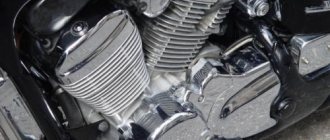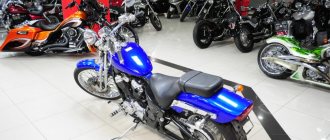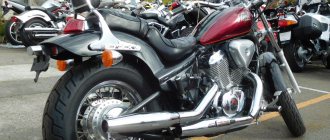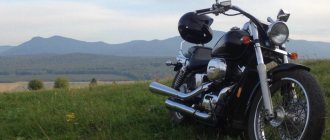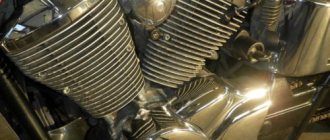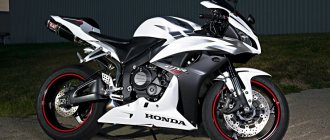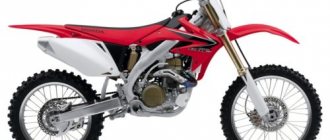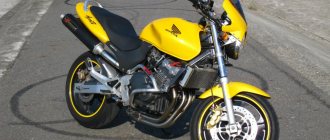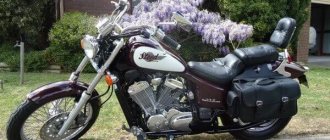RU-MOTO rating
- Reliability
- Chassis
- Appearance
- Comfort
4.3
Verdict
The conclusion is obvious - motorcycles of this class are suitable for beginners. This low-power cruiser successfully combines reliability and an aggressive design that can be customized to your taste.
For beginners and experienced motorcyclists, the desire to experience new sensations gives impetus to purchasing a bike. Honda Steed 400 chopper is one of the worthy options. Its highlight is not only its aggressive design, but also its reliability. It is capable of traveling thousands of kilometers without breakdowns.
The scrupulous Japanese adapted Steed for the American market in 1988. A classic motorcycle made in the class of medium cruisers, it still attracts attention to this day.
Read other motorcycle reviews of Honda CBR 125
We recommend a review of the Yamaha DragStar 400 motorcycle
Specifications
| Year of issue | 1995-1996 | 1998 | ||||
| Model (engine size) | STEED(400) | STEED(400) | ||||
| Modification | VSE | VLX | VCL | VLS | VLX | |
| Frame brand | NC26 | NC37 | NC26 | |||
| Total length (m) | 2,31 | 2,335 | 2,31 | |||
| Overall width (m) | 0,865 | 0,76 | 0,705 | 0,765 | 0,76 | |
| Total height (m) | 1,12 | 1,13 | 1,105 | 1,115 | ||
| Wheelbase (m) | 1,6 | 1,62 | 1,6 | |||
| Ground clearance (m) | 0,14 | 0,13 | ||||
| Seat height (m) | 0,68 | 0,65 | 0,67 | |||
| Total weight/dry weight (kg) | 216/203 | 217/204 | 223/211 | 215/203 | ||
| Number of seats | 2 | |||||
| Gasoline consumption (km/1l) at a speed of 60 km/h | 37,2 | 37,2 | ||||
| 3,1 | 3,3 | 3,1 | ||||
| Engine make | NC25E | NC25E | ||||
| Engine: strokes, fuel control, valves, location and number of cylinders | 4 OHC 3 V2 | |||||
| Engine displacement (cm3) | 398 | 398 | ||||
| Bore and stroke (mm) | 64,0×62,0 | 64,0×62,0 | ||||
| Compression ratio | 9,8 | 9,8 | ||||
| Power (HP @ rpm) | 31 @ 7500 | 31 @ 7500 | ||||
| Torque (kgm @ rpm) | 3,4 @ 5500 | 3,4 @ 5500 | ||||
| VDD0 | VDD0 | |||||
| Oil volume (l) | 2,8 | |||||
| Gas tank volume (l) | 11 | 9,7 | 11 | |||
| Gearbox (number of stages) | 5 | 5 | ||||
| Gear ratios | 1st stage | 3 | 3,166 | |||
| 2nd stage | 2,055 | 2 | ||||
| 3rd stage | 1,545 | 1,5 | ||||
| 4th stage | 1,2 | 1,173 | ||||
| 5th stage | 1,035 | 1,041 | ||||
| 2,058/2,812 | 2,058/2,750 | |||||
| 35° 00’ /164 | 35° 00’ /136 | 35° 00’ /164 | ||||
| Wheels | front | 100/90-19 57S | 90/90-21 54S | 100/90-19 57S | ||
| rear | 170/80-15M/C 77S | |||||
Having studied the Honda Steed 400, we found out that the engine life is 250,000 km, with a maximum speed of 145 km/h. At the same time, the manufacturer declared fuel consumption to be 2.5 liters, but in reality it is 4 or even 5 liters. Consumption largely depends on driving style. Steed has a mass of 216 kg.
The type of Honda Steed 400 carburetor is set in accordance with the modifications on which the characteristics depend. Modifications affect ground clearance, gas mileage, turning radius, and gas tank capacity.
Who can I recommend the Honda Steed 400 (NV400)
Despite the fact that everyone is shouting “Honda Steed 400 is the best motorcycle for a beginner,” you shouldn’t give in to public opinion. “Shame” 400 is suitable for driving in city traffic. On the highway, an already inexperienced driver will feel at least uncomfortable, and not so much because of the speed capabilities, but because of the low dynamics when picking up speed after 80 kilometers per hour. That is, even overtaking a column of agricultural machinery can create a dangerous situation in which a novice motorcyclist will not always be able to take adequate measures.
In addition, we should not forget for whom exactly this “scabies” was created. This motorcycle was designed for the Japanese market, where the 400 cc limit exists as a category on the driver's license. We don’t have these restrictions, so why force ourselves into limits? It would be much more logical to look towards the 600 cc version of the motorcycle, or even pay attention to the 750 cc Shadow or other 800 cc Japanese ones.
However, you can’t write off “itches” like motorcycles that don’t have their own niche. If the operation takes place in a quiet mode in a purely urban area, then this motorcycle will become an excellent vehicle for transportation, and not something ephemeral that should “carry the soul, not the ass.” The appearance of the motorcycle will be a bonus. And only those who are interested in motorcycles will know that you have a small... engine capacity.
Cruiser class chopper modifications
The Honda Steed 400 VLS is equipped with a VDD0 carburetor, the same as on the VSE. A different VDF 1 carburetor is installed on the Honda Steed 400 VLX. The modification marking indicates the features of this model - here are some of them:
- vls - front wheel 21 inches, distance from ground to saddle 650 mm;
- vse - cast disc on the rear wheel instead of spokes;
- vlx is a motorcycle with a standard basic configuration.
Motorcycle Honda Steed 400
Chassis and brakes
The bike has a tubular frame. It is made of steel and is not pretentious, but elegant design. There is nothing superfluous in the design. At first glance, the stylization of American-style motorcycles is noticeable. The same applies to spoked wheels and steering wheel. The latter is comfortable and has medium dimensions.
The pendulum suspension with monoshock absorber at the rear pairs well with the front telescopic forks. The drum acts as the rear brake, while the front uses a twin-piston caliper and a 296mm disc.
Price
A “Steed” that has not felt the surface of our homeland under its wheels is purchased by paying an amount from 2,500 to 3,000 dollars. The price for used devices in Russia starts from 70,000 rubles. The cost of motorcycles from 1996 varies from 90,000 rubles and above.
Read other motorcycle reviews of the Stels Delta 200. Motorcycle review
Price for Honda Steed. Screenshot from the portal moto.avto.ru
Brief history of the model
1988 - start of production and sales of the Honda Steed 400 model. Model: Honda Steed 400 VLX (Japan). Frame number: NC26-100XXXX~. Factory designation: NV400Cj.
1989 - no significant changes. Model: Honda Steed 400 VLX (Japan). Frame number: NC26-105XXXX~. Factory designation: NV400Ck.
1990 - The passenger backrest comes standard. Model: Honda Steed 400 VLX (Japan). Frame number: NC26-110XXXX~. Factory designation: NV400Cl.
1991 - model not produced. 1992 - no significant changes. Model: Honda Steed 400 VLX (Japan). Frame number: NC26-115XXXX~. Factory designation: NV400Cn.
1993 - fuel tank capacity increases from 9 to 11 liters. Model: Honda Steed 400 VLX (Japan). Frame number: NC26-120XXXX~. Factory designation: NV400Cp.
1994 - no significant changes. Model: Honda Steed 400 VLX (Japan). Frame number: NC26-130XXXX~. Factory designation: NV400Cr.
1995 - appearance of new modifications VCL and VSE. Starting this year, the model increases maximum power by 1 hp. and maximum torque by 1 Nm. The compression ratio is reduced from 10 to 9.8. Model: Honda Steed 400 VLX, Honda Steed 400 VCL, Honda Steed 400 VSE, Honda Steed 400 VSE (Japan). Frame number: NC26-140XXXX~ (VLX); NC26-139XXXX~ (VCL); NC26-147XXXX~ (VSE). Factory designation: NV400Ct; NV400CVs; NV400CMt.
1996 - no significant changes. The last year of release of the VCL and VSE modifications. Model: Honda Steed 400 VLX, Honda Steed 400 VCL, Honda Steed 400 VSE, Honda Steed 400 VSE (Japan). Frame number: NC26-150XXXX~ (VLX); NC26-144XXXX~ (VCL); NC26-157XXXX~ (VSE). Factory designation: NV400Cv; NV400CVt; NV400CMv.
1997 - model not produced.
1998 - appearance of the VLS modification. The standard VLX no longer has a stock passenger backrest and becomes a cross between the outgoing VLX and the budget VCL. The suspension settings are changed, the saddle height is reduced by 10 mm. Model: Honda Steed 400 VLX; Honda Steed 400 VLS (Japan). Frame number: NC26-164XXXX~ (VLX); NC37-100-109XXXX~ (VLS). Factory designation: NV400CBw; NV400CSw.
2001 is the last year of VLX production. The model receives an exhaust gas afterburning system and wiring for the installation of an alarm system. Model: Honda Steed 400 VLX (Japan). Frame number: NC26-210XXXX~, NC26-211XXXX~, NC26-212XXXX~. Factory designation: NV400CB1.
Tuning
People who are not worried about losing the warranty have a lot of room for creativity. Starting from installing a leg extension kit to completely changing the appearance of the cruiser.
Subject to modification:
- Exhaust manifolds are decorated with windings, and the gas tank is decorated with stickers.
- Install radiator covers and chrome covers on the engine.
- There are services offering to purchase Honda Steed 400 spare parts for tuning. By resorting to their services, you can decorate your horse with dignity and originality.
Review of the Honda Steed 400 (NV400) motorcycle
One of the most common small-capacity Japanese cruisers is the Honda Steed 400. This motorcycle is recommended to many beginners as their first two-wheeled vehicle, with special emphasis on friendliness and reliability.
Indeed, this “itch” is a unique motorcycle for Honda. This is one of those motorcycles that makes many people now shout “Honda doesn’t break!” But we are talking not so much about the vehicle itself, but about the engine, the resource of which, especially for a volume of 400 cubic meters, is really quite good.
The design of the engine turned out to be so successful that they managed to push it even into motorcycles of other classes. Thus, this engine was installed in the touring enduro Honda Transalp XL400V, the classic Honda Roadster VRX400 and the naked Honda Bros NT400. Subsequently, the same engine migrated to the Honda Shadow 400.
The Honda Steed 400 was produced from 1988 to 2001, but only for the Japanese domestic market. What is noteworthy is that the older model Honda Steed 600 or NV600 was also available only to the Japanese; its export version was initially designated Honda Shadow 600 or VT600.
More than 80 thousand units of these motorcycles were produced for the Japanese market, so it is not surprising that a kind of cult was formed around the “Shame”. A huge number of custom projects have been created based on the Honda Steed 400. Moreover, a separate niche of various modified parts and assemblies has appeared on the market, especially for this motorcycle model. The large number of units of equipment produced easily explains the dominance of these “scabies” in the post-Soviet space, thanks to auctions, but the variety and non-compliance with factory specifications are the consequences of the activities of Japanese craftsmen. However, even without taking into account customization, “Shame” 400 boasts diversity within the model range.
Comparison with competitors in class
Comparing the Steed with the Kawasaki VN 400 Vulcan or Yamaha XV 400 Virago. We came to the conclusion that the bike is unkillable. As for the engine, it is rather weak compared to the competitors listed above. The comfort of riding and handling depends on the height of the rider. People taller than 185 cm feel uncomfortable driving, but a biker shorter than 185 cm feels comfortable.
Power, torque and V-twin engine make this chopper a favorite in its class among competitors Suzuki Intruder 400, Kawasaki VN 400 Vulcan, Yamaha XV 400 Virago.
Engine
The machine has a four-stroke two-cylinder V-shaped engine. Its effective volume is 398 cm³. The liquid-cooled engine produces the following maximum performance: at 6000 rpm the torque is 33 Nm, and at 7500 rpm the power reaches 31 hp. The model will accelerate to 100 km/h in 11.1 seconds, and the top speed is 130 km/h.
Reviews
The bike is reliable, I fully confirm that the Honda Steed 400 bobber is indestructible. I'm on my second season and no problems. The engine would be more helpful and there would be no price for it. The disadvantages include that your hands shake after a trip of 200 km or more. This is a very comfortable and convenient motorcycle.
Screenshot of review of Honda Steed No. 1.
Screenshot of review No. 2
For whom
Here are the main features of the Honda Steed 400:
- 31 hp and 33 Nm;
- average dimensions for the class;
- small tank 11 l.
The motorcycle is not particularly powerful, which makes it a good choice for novice drivers. At the same time, such a machine will be quite enough for those who do not need much from a bike, and they just want to ride it without haste.
